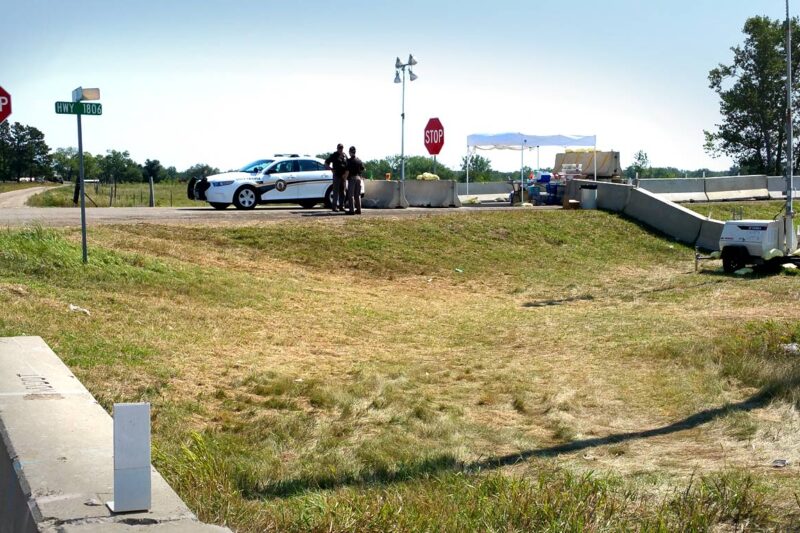North Dakota’s Governor Declared a State of Emergency to Deal With Peaceful Oil Pipeline Protesters. We Call It a State of Emergency for Civil Rights.


Something historic is happening in North Dakota. People are protesting an oil pipeline. And the people who are protesting the oil pipeline are mostly Native Americans.
It’s historic because the 200 or so tribes that are protesting the construction of the $3.7 billion Dakota Access Pipeline have not united together for more than 150 years. Several thousand indigenous people from across the county have journeyed to a little-known pasture on the prairie just miles from the Standing Rock Sioux Tribe’s reservation — where the oil pipeline is slated to cross the Missouri River — to protect the land the tribes consider sacred and culturally significant as well as the water necessary for life. The protectors, as the protesters call themselves, are defending the land and water using little more than the right to assemble and speak freely, a long-standing protection afforded by the U.S. Constitution.
Unfortunately, there is another kind of history happening here. It’s a history that is all too familiar to indigenous people; it is the shameful cycle of government-sanctioned disregard for the human and civil rights of Native Americans. In response to the pipeline protests, North Dakota’s government suppressed free speech and militarized its policing by declaring a state of emergency and calling out the National Guard.
The origins of the state’s overreaction can be traced to a lawsuit filed by the oil pipeline company — Dakota Access — against protesters in federal court to stop demonstrations near its construction sites. To sway the court’s decision and likely public opinion, too, the pipeline company claimed it feared violence from protesters was imminent because of a few vague threats posted on social media and an anonymous email. Protesters have been arrested for pushing through police lines to stop construction equipment, but incidents like these in no way support declaring a state of emergency and militarizing the state’s response.
Instead, the pipeline company has conflated protesters’ acts of civil disobedience, like trespass onto private land to stand in the path of oncoming bulldozers, with violence and looming chaos. It seems state officials have done the same after reports of the company’s claims surfaced in the media.
Governor, your citizens’ civil rights are in danger, and you’re complicit.
And by declaring a state of emergency in response to peaceful protests, Gov. Jack Dalrymple allowed law enforcement to erect concrete barricades on a major public highway 30 miles north of the protest sites and encampments. Travelers approaching the barricade encountered powerful flood lights for nighttime use and four to six police officers. People heading south toward the protest and the reservation were stopped by police and told they could not drive toward the protest on the highway. A detour on a separate highway took travelers south toward the reservation and the protest area, adding unnecessary distance and time to the trip.
A roadblock 30 miles from the site of a protest is not the least restrictive means to protect the public or the protesters. It’s hard not to see the roadblock for what it really is: an attack on free speech and freedom of association. It’s also a purposeful and exacting punishment meted out to the Standing Rock Sioux Tribe and its members who live on the reservation near the protest for encouraging peaceful protest of the pipeline.
An employee of the tribe aptly described the roadblock’s impact on the tribe’s members as financially harmful. The road closure added significant distance and travel time to and from the rural reservation to Bismarck, the nearest large city. Time and distance increase fuel cost and that makes a world of difference to many tribal members who live in poverty. The average income of a resident on Standing Rock’s reservation is $4,421 a year.
Last Thursday, the roadblock was converted into an “informational” checkpoint. We hoped this would begin to ease the tension between the state and the protesters, but Gov. Dalrymple immediately activated the National Guard to enforce the checkpoint so that people now face armed soldiers when they are stopped and required to report their destination before traveling further down the highway. The state’s declaration of emergency, the highway roadblock and checkpoint, and National Guard call-up sets a tone of intimidation and signals its intent to silence and punish free speech.
The governor expected violent protesters and protests, but his expectations of violence have been met instead with peaceful civil disobedience. Overall, there is little to no evidence of violence on the part of protesters to justify the state’s response, but there is significant evidence of violence instigated by the pipeline company. Video footage captured by Democracy Now shows pipeline private security forces used dogs and pepper spray to attack protesters who blocked bulldozers.
And yet the National Guard still patrols a highway checkpoint; the police appear at peaceful protests in riot gear; and the governor continues to ignore the shameful violence inflicted on protesters by pipeline security.
Yes, it’s a state of emergency in North Dakota, Gov. Dalrymple. But it’s not public safety that is at risk. Governor, your citizens’ civil rights are in danger, and you’re complicit.
